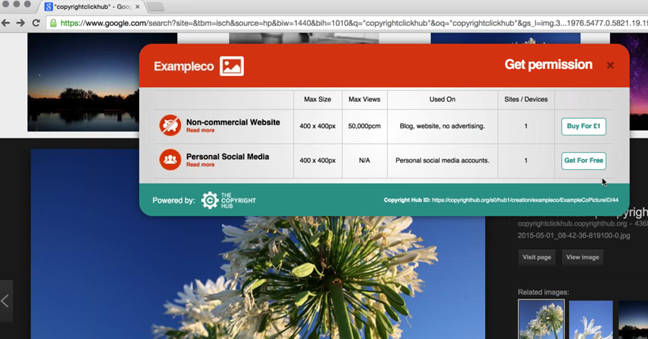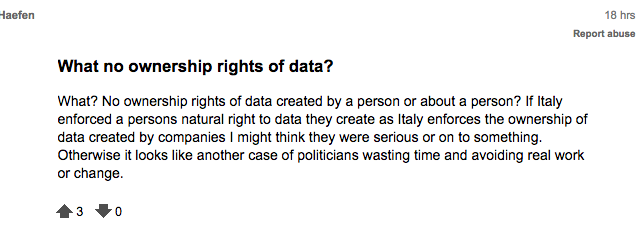Original URL: https://www.theregister.com/2015/07/31/copyright_hub_launch/
Open source Copyright Hub unveiled with '90+ projects' in the pipeline
An internet that didn't rip you off? Who'd want a thing like that?
Posted in Legal, 31st July 2015 08:27 GMT
The web has grown up without letting people own and control their own stuff, but a British-backed initiative might change all that, offering a glimpse of how the internet can work in the future. Their work will all be open sourced early next year.
Britain's much-anticipated Copyright Hub was given ministerial blessing when it finally opened its kimono today, boasting a pipeline of over 90 projects covering commercial and free uses.
A handy new site – Copyright done right – has also been launched, explaining what it offers. The initiative has sparked global interest.
Today, it turns out that most people actually do want what they’re missing from today’s internet: property rights (or property-ish rights) for the digital stuff they post to the interwebs. But many have found that copyright just doesn’t work for them. The Hub aims to build rights-aware layers on top of the internet, so that people can track how what they make public is used, much as DNS added ease of use to naming protocols and VPNs added privacy standards to the basic bare-bones internet.
The demo example at the Hub’s coming-out party is easier to understand than explain in words: in the demo, right-clicking on a picture in Google Images takes you straight to some licensing information about that picture.

One-click licensing. Right clicking with the example plug-in enabled automatically finds the owner and displays usage options. The Hub hopes that browser makers will build the protocols into future software.
So what previously took days or weeks to track down and negotiate is handled in the background in fractions of a second, because content has identifiers. By reducing the friction and the cost of licensing to almost zero, lots more licensing should be possible. One can envisage a whole new internet that supports functioning markets growing out of the rancid free-for-all of today’s clickbait-infested swamp.
Dominic Young, head of the Hub, points out that the Hub is totally agnostic about commercial or free uses – because even free software and free content are built on property rights.
"We have no ideology about whether people should make money from it, we just think it should be up to them. Currently they don’t have that choice,” he told us.
“Copyright is actually the freedom to decide what happens to your work. Everyone has it. Should people be able to make their own choice about how it’s used? Most people would say ‘Yes'. Should they have a single choice thrust one them? Most people would say ’No’," Young added.
"Free licences will become very commonplace,” he predicted. "You might simply want to know who is using something of yours. That might lead to a commercial prospect that you might want to take up or reject.”
Open source enthusiasm
The Hub is backed with enthusiastic responses from Acorn founder Herman Hauser and (less surprisingly) creative industry grandees including Peter Bazalgette and David Puttnam. And it’s also gathered some global interest, as Australia has chipped in AU$50,000.
Young says the code will be open sourced with the idea that people can run with it.
"Anyone can take protocols and set up their own hub and marketplace. There’s no single anointed place where everything is centralised and controlled from. You can start a Creative Commons Hub or a USA Hub," he explains.
The standards could rapidly find their way into your smartphone and cameras, so anything shared is automatically embedded with machine-findable ownership information. Today, stripping this metadata from images is actually a criminal offence under UK copyright law – but that doesn’t stop large media and technology corporations from doing it on an industrial scale.
If individuals became aware of their rights and asserted them, perhaps they’d stop pretty quickly.
How the Hub got here
Attaching property rights to digital stuff isn’t a new idea. The Linked Content Coalition has been beavering away at standards for years and the Hub builds on their work, as well as industry identifiers, where possible.
The idea was included in the Hargreaves review of copyright in 2011 after photographers had shown ministers a demo of image identification in practice, arguing that modern image recognition technology means there should be no unidentifiable images floating around on the internet. We wrote about it at the time here. Getty’s PicScout, part of the 2010 demos, was present at the Hub launch today.
Richard Hooper, the former Ofcom deputy and chair of the Broadband Stakeholder Group, who has shepherded the Hub to reality, said the culture sector would be one of the first to benefit. If successful, it’s likely to make licensing of very low-cost items easy, but it isn’t really the place where billion-dollar deals like football rights will get processed.
The Hub faces several challenges. One is that it needs the co-operation of vast technology companies who who have built fabulous fortunes on the absence of property rights. Silicon Valley’s pervasive propaganda has been very effective in convincing people to act against their own economic interests and not use their rights, or even campaign to weaken them.
For example, the “manifesto of internet rights” commissioned by the Italian Parliament this week lists 14 rights – but as commenters point out, the right you already have, to ownership of your own stuff, isn’t one of them.

A recent manifesto of "internet rights" has a gaping hole in it.
But it’s not inconceivable that Facebook and Google could get benefit from an explosion of properly-functioning marketplaces – and users can vote with their feet. Imagine if a Facebook rival emerged that didn’t require users to surrender their rights, and that rewarded them for their creativity with real dosh. Who’d want to stick around with the old Facebook that doesn’t do either? ®